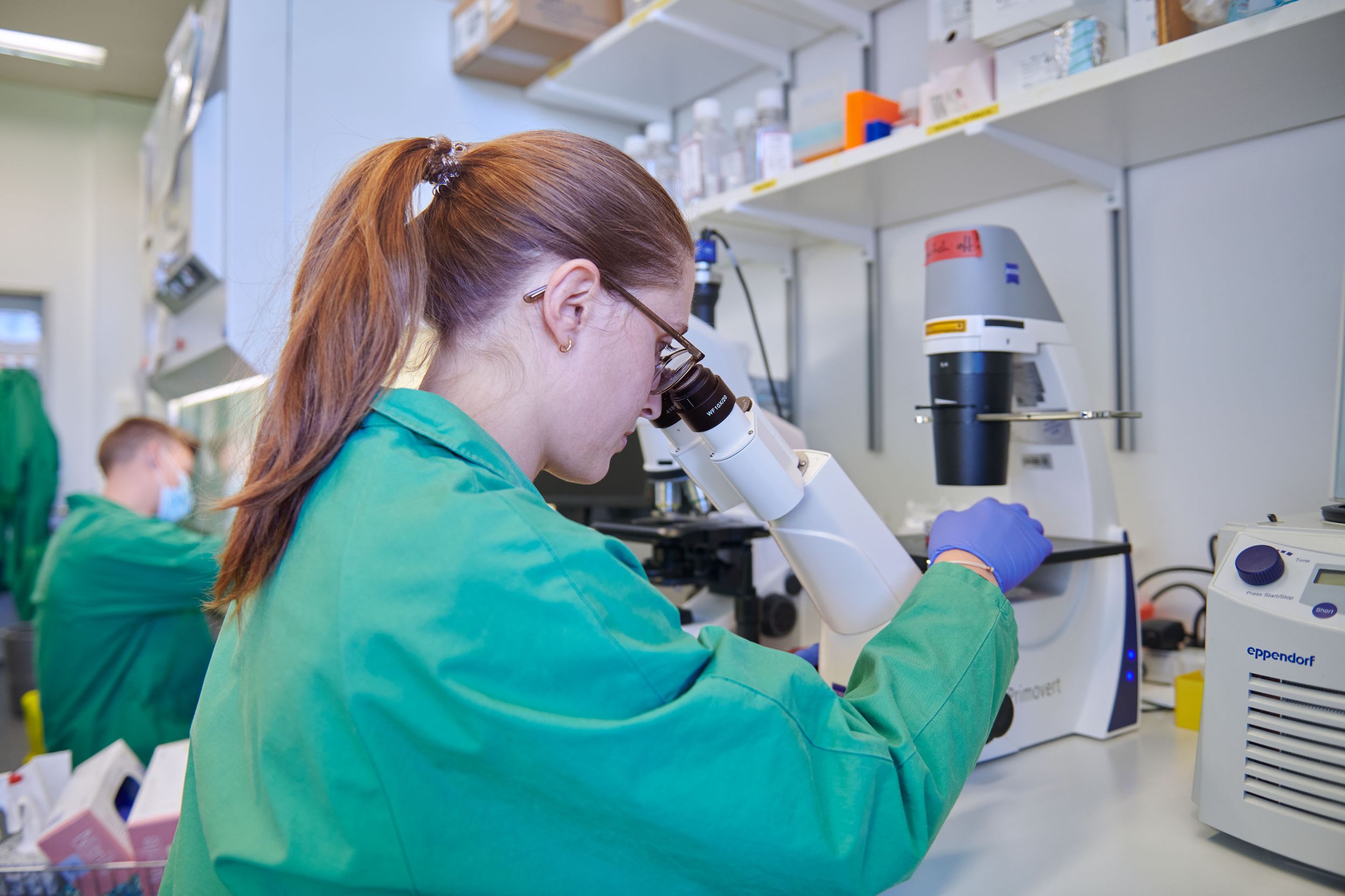
Research
We offer cancer patients the opportunity to participate in clinical trials. This allows patients to actively participate in the progress of cancer treatments and benefit from additional quality control by the study team and the ethics committee. Clinical trials also allow access to the latest drugs.
Here you can find information about our research:
Clinical studies
The therapies of tomorrow come from the studies of today!
We offer our patients the opportunity to take part in clinical studies. This assures you that you will be treated in accordance with the latest scientific findings and the highest quality standards. Our range of studies is very broad and extends from quality of life assessment and therapy support measures to new therapeutic approaches and promising drugs for various types of cancer.
Open studies
Lung
Is there a suitable study for me?
Your oncology doctor will be happy to help you further. However, if no trial is suitable for you at the moment, it is possible that a suitable trial will be open for you at a later stage of your treatment.
Is participation in the study voluntary?
Yes, participation in any study is completely and exclusively voluntary. Only decide whether you want to take part once all your questions have been answered and you are sure. If you decide not to take part in a study, this will not affect your further treatment.
Do I have to change my doctor if I take part in a study?
As a rule, you will continue to be cared for by your previous doctor during your participation in the study. You may also get to know the doctor responsible for the study at the university hospital. You may also have contact with the study team.
Does participating in a study mean that patients are exposed to unnecessary risks ("guinea pigs")?
No! Every study is reviewed by the Basel Ethics Committee(www.ekbb.ch) before it is conducted. The aim of this independent review is to ensure that no patient is exposed to unnecessary risks. Since every treatment (within and outside of studies) can be associated with risks/side effects, you will be informed in detail about possible risks. Weigh up for yourself whether the risk/benefit ratio is right for you personally before you decide to undergo treatment.
Will I incur additional costs by participating in the study?
No. The costs for the treatment that you would have received outside the study (standard therapy) will be charged to your health insurance as usual. Additional costs caused by participation in the study will not be charged.
Can I stop participating in the study?
Yes, you can discontinue your participation in the study at any time without giving a reason. Withdrawing from the study has no influence on your further treatment in oncology.
Can I also take part in a study if I am being treated in another hospital or practice?
First find out whether there is a suitable study for you by contacting the study team yourself or your doctor: PD Dr. Dr. Sacha Rothschild sacha.rothschild@usb.ch or Céline Jenni celine.jenni@usb.ch . There are studies that can only be carried out at the University Hospital. This would mean that you would have to transfer your treatment to the university hospital for the duration of your participation in the study. At the end of the study, you will continue to be cared for by your previous doctor.
Lab of Cancer Immunology
Immune modulation and cancer: implications for novel cancer therapies
Cancer Immunotherapy: Harnessing the potential of anti-tumor immunity
It is increasingly appreciated that cancers are recognized by the immune system, and under some circumstances, the immune system may control or even eliminate tumors.
Only recently, this concept has been reinvigorated by large clinical trials, demonstrating improved overall survival and, importantly, durable responses. This success has provided clear evidence that anti-tumor immunotherapy has broad efficacy across a diverse spectrum of malignancies owing to its potential for a large and sustained clinical benefit. Exciting perspectives to increase efficacy include combination therapies with targeted therapies and cytotoxic agents. Of particular note, both may modulate immune responses and augment host immunity. For example, selected agents increase the immunogenicity of dying cancer cells, inhibit the function of locally immuno-suppressive populations trigger DC maturation.
We investigate mechanisms of anti-tumor immunity in a variety of different mouse models including immunocompetent syngeneic and genetically modified tumor models engineered to carry mutations in genes known to be involved in human cancers. These models offer the platform to experimentally perturb the tumor microenvironment, using different anti-tumor agents and provide increased information on their immunostimulating effects, which are currently poorly defined. The aim of our research is to improve our understanding of the immuno-modulating capacities of anti-cancer therapies and pave the way for a rationale design of treatment algorithms combining anti-tumor agents with immunotherapy.
Development of anti-cancer strategies in early clinical trials
The focus lies on the investigation and development of treatment strategies, targets and delivery platforms in early trials in medical oncology.
In collaboration with the Clinical Research Center (CCRC) at our division, we have programs ongoing to create a pipeline of agents that can move into the clinic. In translational projects, we aim at defining predictors of therapeutic responses and at understanding the mechanism of treatment responses and resistance and thereby defining potential new targets for cancer immunotherapy. The programs include cancer vaccines, immune modulatory drugs, monoclonal antibodies, and nanoparticles such as immunoliposomes.
In collaboration with the Department of Radiology and Nuclear Medicine (Prof. Wild), a program is centred on radiopeptides against peptide receptors. To optimally develop novel anti-cancer agents such as immunotherapeutics we perform in-vitro assays to study how these compounds modulate human effector populations in freshly excised tumor tissue, thus faithfully mimicking the situation found in cancer patients. This program is performed in collaboration with the Department of Thoracic Surgery (Prof. Lardinois), Department of Gynecology (Prof. Heinzelmann) and Pathology (Prof. Bubendorf, Prof. Dirnhofer).
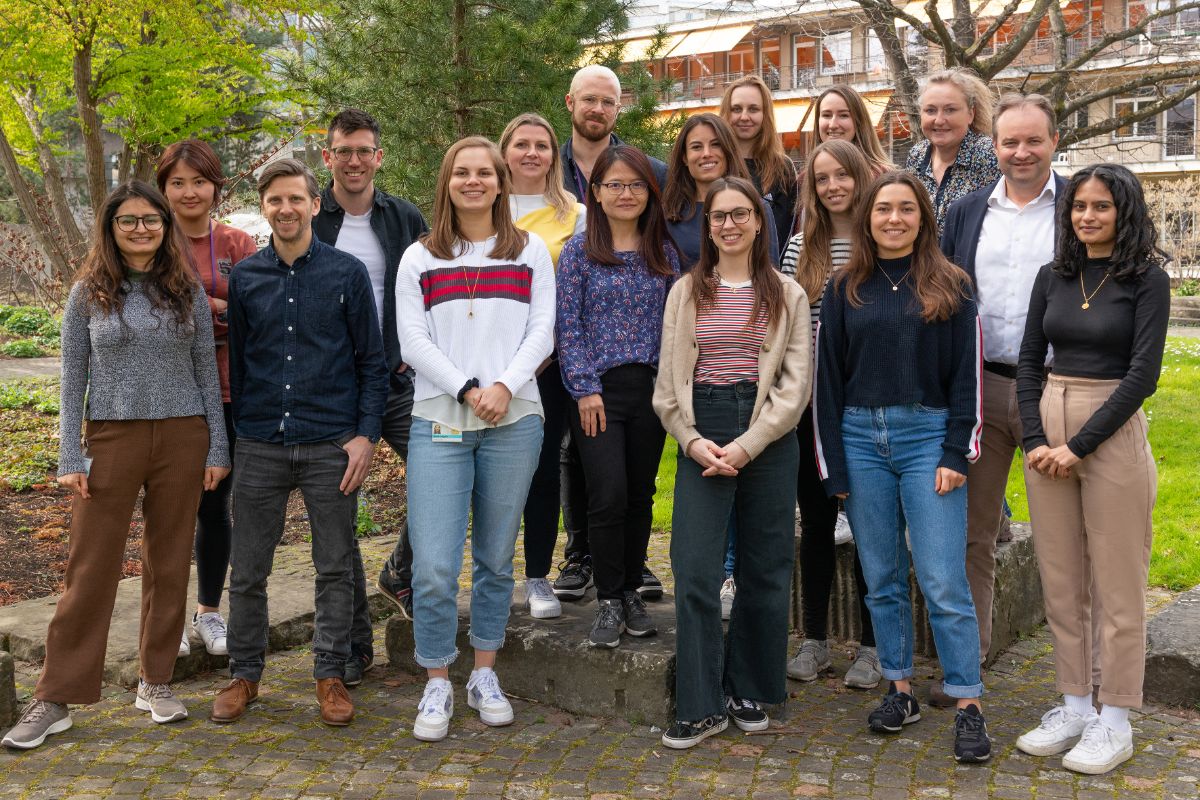
Research Group Leader
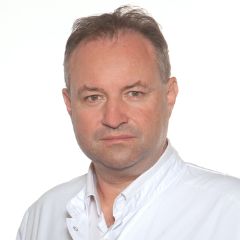
Prof. Alfred Zippelius
Co-Chefarzt
Medizinische Onkologie FMH, Mitglied Tumorzentrum, Leiter Labor Tumorimmunologie
Hauttumore, Thoraxtumore, Immuntherapie
Lab members
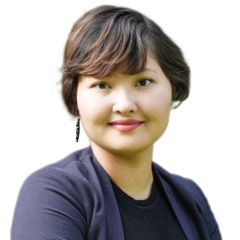
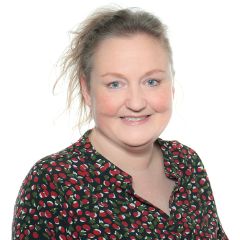
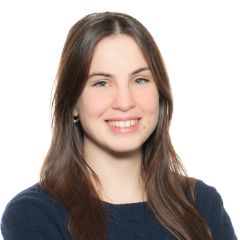
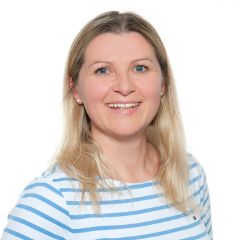
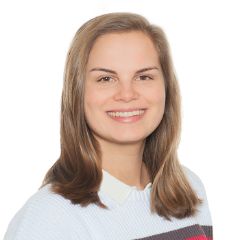
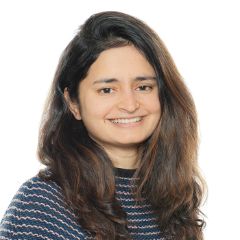
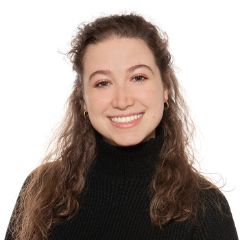
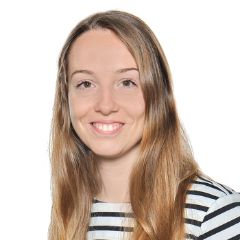
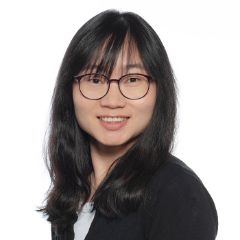
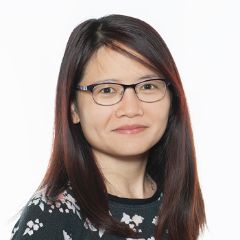
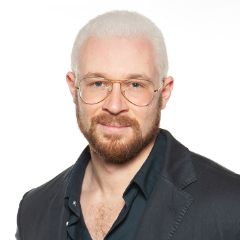
Sofia Tundo
PhD student
Collaborations
University Hospital Basel
- Pathology
Prof. Dr. med. Bubendorf
Prof. Dr. med. Dirnhofer
Dr. med. Savic
- Thoracic Surgery
Prof. Dr. med. Lardinois
- Women's Clinic
Prof. Dr. med. Heinzelmann
University of Basel
- Prof. Dr. med. Christoph Hess
Immunobiology, Department of Biomedicine
- Prof. Dr. med. Daniel Pinschewer
Experimental Virology, Department of Biomedicine
National academic collaborations
- Prof. Dr. med. Kirsten Mertz
Institute of Pathology and Department of Visceral Surgery, Liestal
- Prof. Dr. med. Robert Rosenberg
Institute of Pathology and Department of Visceral Surgery, Liestal
- Prof. Dr. Sai Reddy
Department of Biosystems Science and Engineering, ETH Zurich
- Prof. Dr. Ping-Chi Ho
Department of Fundamental Oncology, UNIL Lausanne -
Prof. Dr. Steinmetz
Paul Scherrer Institute, Villigen
International academic collaborations
- Prof. Dr. med. Lothar Tietze
Pathology, Lahr-Ettenheim (Germany)
- Prof. Dr. Christoph Rader
Department of Cancer Biology, Scripps Research Institute Florida (USA) -
Prof. Dr. Zlatko Trojanoski
Institute of Bioinformatics, Medical University of Innsbruck (Austria) -
Gillian Griffiths
Camebridge Institute for Medical Research (UK) -
Eric Vivier
Marseille Université (France)
Industrial collaborations
National & International
- F. Hoffmann-La Roche, Basel, Switzerland
- MedImmune, Cambridge, UK
- T3 Pharma, Allschwil, Switzerland
- Bright Peak Therapeutics, Basel, Switzerland
- Vector BioPharma , Basel, Switzerland
Publications
Recent Articles and Reviews 2023
-
Dual TLR9 and PD-L1 targeting unleashes dendritic cells to induce durable antitumor immunity
Fernandez-Rodriguez L, Cianciaruso C, Bill R, Trefny MP, Klar R, Kirchhammer N, Buchi M, Festag J, Michel S, Kohler RH, Jones E, Maaske A, Kashyap AS, Jaschinski F, Dixon KO, Pittet MJ, Zippelius A. J Immunother Cancer 2023 May;11(5):e006714. doi:10.1136/jitc-2023-006714. PMID: 37208130
- Deletion of SNX9 alleviates CD8 T cell exhaustion for effective cellular cancer immunotherapy.
Trefny MP, Kirchhammer N, Auf der Maur P, Natoli M, Schmid D, Germann M, Fernandez Rodriguez L, Herzig P, Lötscher J, Akrami M, Stinchcombe JC, Stanczak MA, Zingg A, Buchi M, Roux J, Marone R, Don L, Lardinois D, Wiese M, Jeker LT, Bentires-Alj M, Rossy J, Thommen DS, Griffiths GM, Läubli H, Hess C, Zippelius A. Nat Commun. 2023 Feb 2;14(1):86. doi: 10.1038/s41467-022-35583-w. PMID: 36732507
Recent Articles and Reviews 2022
- Magnesium sensing via LFA-1 regulates CD8+ T cell effector function.
Lötscher J, Martí I Líndez AA, Kirchhammer N, Cribioli E, Giordano Attianese GMP, Trefny MP, Lenz M, Rothschild SI, Strati P, Künzli M, Lotter C, Schenk SH, Dehio P, Löliger J, Litzler L, Schreiner D, Koch V, Page N, Lee D, Grählert J, Kuzmin D, Burgener AV, Merkler D, Pless M, Balmer ML, Reith W, Huwyler J, Irving M, King CG, Zippelius A, Hess C.
Cell. 2022 Feb 17;185(4):585-602.e29. doi: 10.1016/j.cell.2021.12.039. Epub 2022 Jan 19.
PMID: 35051368
- Targeting cancer glycosylation repolarizes tumor-associated macrophages allowing effective immune checkpoint blockade.
Stanczak MA, Rodrigues Mantuano N, Kirchhammer N, Sanin DE, Jacob F, Coelho R, Everest-Dass AV, Wang J, Trefny MP, Monaco G, Bärenwaldt A, Gray MA, Petrone A, Kashyap AS, Glatz K, Kasenda B, Normington K, Broderick J, Peng L, Pearce OMT, Pearce EL, Bertozzi CR, Zippelius A, Läubli H.
Sci Transl Med. 2022 Nov 2;14(669):eabj1270. doi: 10.1126/scitranslmed.abj1270. Epub 2022 Nov 2.
PMID: 36322632
- Targeting immunoliposomes to EGFR-positive glioblastoma.
Kasenda B, König D, Manni M, Ritschard R, Duthaler U, Bartoszek E, Bärenwaldt A, Deuster S, Hutter G, Cordier D, Mariani L, Hench J, Frank S, Krähenbühl S, Zippelius A, Rochlitz C, Mamot C, Wicki A, Läubli H.
ESMO Open. 2022 Feb;7(1):100365. doi: 10.1016/j.esmoop.2021.100365. Epub 2022 Jan 5.
PMID: 34998092 Free PMC article. Clinical Trial.
- NK cells with tissue-resident traits shape response to immunotherapy by inducing adaptive antitumor immunity.
Kirchhammer N, Trefny MP, Natoli M, Brücher D, Smith SN, Werner F, Koch V, Schreiner D, Bartoszek E, Buchi M, Schmid M, Breu D, Hartmann KP, Zaytseva P, Thommen DS, Läubli H, Böttcher JP, Stanczak MA, Kashyap AS, Plückthun A, Zippelius A.
Sci Transl Med. 2022 Jul 13;14(653):eabm9043. doi: 10.1126/scitranslmed.abm9043. Epub 2022 Jul 13.
PMID: 35857639
- Combination cancer immunotherapies: Emerging treatment strategies adapted to the tumor microenvironment.
Kirchhammer N, Trefny MP, Auf der Maur P, Läubli H, Zippelius A.
Sci Transl Med. 2022 Nov 9;14(670):eabo3605. doi: 10.1126/scitranslmed.abo3605. Epub 2022 Nov 9.
PMID: 36350989 Review.
- PD-1T TILs as a Predictive Biomarker for Clinical Benefit to PD-1 Blockade in Patients with Advanced NSCLC.
Hummelink K, van der Noort V, Muller M, Schouten RD, Lalezari F, Peters D, Theelen WSME, Koelzer VH, Mertz KD, Zippelius A, van den Heuvel MM, Broeks A, Haanen JBAG, Schumacher TN, Meijer GA, Smit EF, Monkhorst K, Thommen DS.
Clin Cancer Res. 2022 Nov 14;28(22):4893-4906. doi: 10.1158/1078-0432.CCR-22-0992.
PMID: 35852792
- Corrigendum to 'Long-term outcomes of operable stage III NSCLC in the pre-immunotherapy era: results from a pooled analysis of the SAKK 16/96, SAKK 16/00, SAKK 16/01, and SAKK 16/08 trials': [ESMO Open Volume 7, Issue 2, (2022), 100455].
König D, Schär S, Vuong D, Guckenberger M, Furrer K, Opitz I, Weder W, Rothschild SI, Ochsenbein A, Zippelius A, Addeo A, Mark M, Eboulet EI, Hayoz S, Thierstein S, Betticher DC, Ris HB, Stupp R, Curioni-Fontecedro A, Peters S, Pless M, Früh M.
ESMO Open. 2022 Jun;7(3):100494. doi: 10.1016/j.esmoop.2022.100494. Epub 2022 Apr 22.
PMID: 35468561 Free PMC article. No abstract available.
- Validation of Pretreatment Prognostic Factors and Prognostic Staging Systems for Small Cell Lung Cancer in a Real-World Data Set.
Hagmann R, Zippelius A, Rothschild SI.
Cancers (Basel). 2022 May 25;14(11):2625. doi: 10.3390/cancers14112625.
PMID: 35681605 Free PMC article.
- Long-term outcomes of operable stage III NSCLC in the pre-immunotherapy era: results from a pooled analysis of the SAKK 16/96, SAKK 16/00, SAKK 16/01, and SAKK 16/08 trials.
König D, Schär S, Vuong D, Guckenberger M, Furrer K, Opitz I, Weder W, Rothschild SI, Ochsenbein A, Zippelius A, Addeo A, Mark M, Eboulet EI, Hayoz S, Thierstein S, Betticher DC, Ris HB, Stupp R, Curioni-Fontecedro A, Peters S, Pless M, Früh M.
ESMO Open. 2022 Apr;7(2):100455. doi: 10.1016/j.esmoop.2022.100455. Epub 2022 Apr 7.
PMID: 35398718 Free PMC article.
- High-throughput T cell receptor engineering by functional screening identifies candidates with enhanced potency and specificity.
Vazquez-Lombardi R, Jung JS, Schlatter FS, Mei A, Mantuano NR, Bieberich F, Hong KL, Kucharczyk J, Kapetanovic E, Aznauryan E, Weber CR, Zippelius A, Läubli H, Reddy ST.
Immunity. 2022 Oct 11;55(10):1953-1966.e10. doi: 10.1016/j.immuni.2022.09.004. Epub 2022
Recent Articles and Reviews 2021
- Voabil P, de Bruijn M, Roelofsen L, Hendriks S, Brokamp S, van den Braber M, Broeks A, Sanders J, Herzig P, Zippelius A, Blank C, Hartemink K, Monkhorst K, Haanen J, Schumacher T, Thommen D. An ex vivo tumor fragment platform to dissect response to PD-1 blockade in cancer. Nature Medicine.(2021), doi.org/10.1038/s41591-021-01398-3
- Bonilla W, Kirchhammer N, Marx A, Kallert S, Krzyzaniak M, Lu M, Darbre S, Schmidt S, Raguz J,Berka U, Vincenti I, Pauzuolis M, Kerber R, Hoepner S, Günther S, Magnus C, Merkler D, Orlinger K, Zippelius A, Pinschewer D. Heterologous arenavirus vectorprime-boost overrules self-tolerancefor efficient tumor-specific CD8 T cell attack. Cell Reports Medicine.(2021), doi.org/10.1016/j.xcrm.2021.100209
- Brücher D, Kirchhammer N, Smith S, SchumacherJ, Schumacher N, Kolibius J, Freitag P, Schmid M, Weiss F, Keller C, GroveM, Greber U, Zippelius A, Plückthun A. iMATCH: an integrated modular assemblysystem for therapeutic combinationhigh-capacity adenovirus gene therapy. Molecular Therapy. (2021), doi.org/10.1016/j.omtm.2021.01.002
- Trüb M, Zippelius A. Tertiary Lymphoid Structures as a Predictive Biomarker of Response to Cancer Immunotherapies. Front Immunol.(2021), doi:10.3389/fimmu.2021.674565
- Natoli M, Herzig P, Pishali Bejestani E, Buchi M, Ritschard R, Kenneth Lloyd G, Mohanlal R, Tonra J, Huang L, Heinzelmann V, Trüb M, Zippelius A, Kashyap A. Plinabulin, a Distinct Microtubule-Targeting Chemotherapy, Promotes M1-Like Macrophage Polarization and Anti-tumor Immunity. Front. Oncol. (2021), doi: 10.3389/fonc.2021.644608
Contact
Laboratory of Cancer Immunology
Department of Biomedicine
Hebelstrasse 20
4031 Basel
Funding
- Monique Dornonville de la Cour
- Swiss National Science Foundation
- Fondazione San Salvatore
- Cancer League of both Basel
- Swiss Cancer League
- Sassella Foundation
- Research Fund of the University of Basel
- Immunotherapy Foundation (USB)
- Innovation Focus Cellular Therapy
We would like to thank the present and past funders of our lab!
Alumni
Leyla Don
Laboratory Technician until October 2023
Now: Research Associate - Novartis, Basel
Dr. Markus Germann
PostDoc until June 2023
Now: PostDoc - Roche, Basel
Dr. Laura Fernandez Rodriguez
PostDoc until February 2023
Dr. Marcel Trefny
PostDoc until November 2022
Now: PostDoc - LMU, Kobold Lab, Munich
Dr. Marina Natoli
PostDoc until August 2022
Now: Senior Scientist - Astra Zeneca, Camebridge
Claudia Gärtner-Pelham
Laboratory Technician until May 2022
Now: unknown
Dr. Nicole Kirchhammer
PostDoc until January 2022
Now: Associate Director Immunology - Vector Biopharma
Dr. Marta Trüb
PostDoc until August 2021
Now: Group Leader and Associate Director - Numab Therapeutics AG, Wädenswil
Dr. Yang Liu
PostDoc until January 2021
Now: Scientist - Novartis Switzerland
Beatrice Dolder-Schlienger
Laboratory Technician until December 2020
Now: Retired
Dr. Abhishek Kashyap
Project leader until May 2020
Now: Director - Cancer Immunology and Immune Modulation, Boehringer Ingelheim
Florian Rosentreter
Technician until February 2020
Now: Technician - Roche Basel
Dr. Elham Pishali
PostDoc until January 2020
Now: Investigator - Translational Medicine, Novartis Basel
Dr. Daniela Thommen
PostDoc until April 2018
Now: Junior Group Leader - The Netherlands Cancer Institute, Amsterdam
Dr. Lucia D'Amico
PostDoc until March 2018
Now: Head of Laboratory - TargImmune Therapeutics, Basel
Dr. Sandra Kallert
PostDoc until January 2018
Now: Principal Scientist - Oncology Translational Research, Novartis Basel
Dr. Michal Stanczak
PhD student until 2018
Now: PostDoc - Max Planck Institute of Immunology and Epigenetics, Germany
Dr. Franziska Uhlenbrock
PostDoc until December 2017
Now: Senior Scientist - Symphogen, Denmark
Dr. Philipp Müller
Labhead until March 2016
Now: Executive Director/Investment Manager - Boehringer Ingelheim Venture Fund, Germany
Dr. Jens Schreiner
Postdoc until 2016
Now: Specialist FAMH for Immunology - Unilabs, Zurich
Dr. Matthias Kreuzaler
PostDoc until October 2015
Now: PostDoc - Intitute for Infection Biology, University Hospital Basel
Dr. Narasimha Rao Uda
PostDoc until December 2015
Now: Senior Research Associate - University of Geneva
Dr. Kea Martin
PhD student until June 2015
Now: Scientist - Polyneuron Pharmaceuticals, Basel
Dr. Sébastien Wieckowski
PostDoc until 2015
Now: Senior Scientist - School of Life Sciences, Roche Basel
Lab for Cancer Immunotherapy
Targeting glycans to improve anti-cancer immunity
Our main goal is to improve immunotherapy for cancer patients by using translational in vitro and in vivo tumor models, performing correlative analysis of patients treated with immunotherapy and conducting early clinical interventional trials (also see link to Medical Oncology).
One of our research focus is on the role of glycans and glycan-binding receptors in anti-cancer immunity. Glycans can mediate important interactions with immune cells and manipulation of glycans and glycan-binding receptors (lectins) bear a great potential to improve anti-tumor immune reactions. Glycan-mediated interactions in cancer immunology are significantly underexplored and could be used to improve anti-cancer immunity. Our group has studied the interaction between glycans that contain sialic acids (siaologlycans) and their interaction with Siglec receptors on immune cells and have demonstrated that this pathway can be targeted to augment T cell stimulation and tumor control. Current goals include improvement of cancer immunotherapy by modifying glycans in the tumor microenvironment and glycans of cellular products for adoptive cell therapies including genetically modified T cells.
An additional focus of our group is the improvement of immune checkpoint blockade and adoptive cellular therapies by investigating mechanisms and patterns of resistance to these therapies. To this end, we are investigating the tumor microenvironment as well as circulating immune cells in patients undergoing immune checkpoint blockade or adoptive T cell transfer. Identified pathways are further studied in the laboratory for their potential as new targets to improve antitumor immune responses.
Cellular therapy for solid cancers
Adoptive cell therapy with TILs (tumor-infiltrating lymphocytes) for melanoma patients have been developed several years ago at the NIH. Clinical trials have shown high and very encouraging response rates depending on the stage and selection of patients. We have established and expansion protocol for the treatment of melanoma patient refractory to standard immune therapy with checkpoint inhibitors (and BRAF/MEK inhibition in BRAF mutated patients).
Our first planned clinical trial includes an adapted classical expansion protocol and the application of IL-2 after the adoptive TIL transfer. In addition, we will perform a PD-1 blockade after stopping IL-2 treatment to render the tumor microenvironment more permissive for tumor-attacking T cells.
Our program will enable us to expand this treatment option to other tumor types. In addition, we are working to improve the expansion protocols and the specific expansion of tumor-recognizing T cells. Finally, the program will also allow for a direct translation of new genitically-modified T cell therapies into early clincical trials
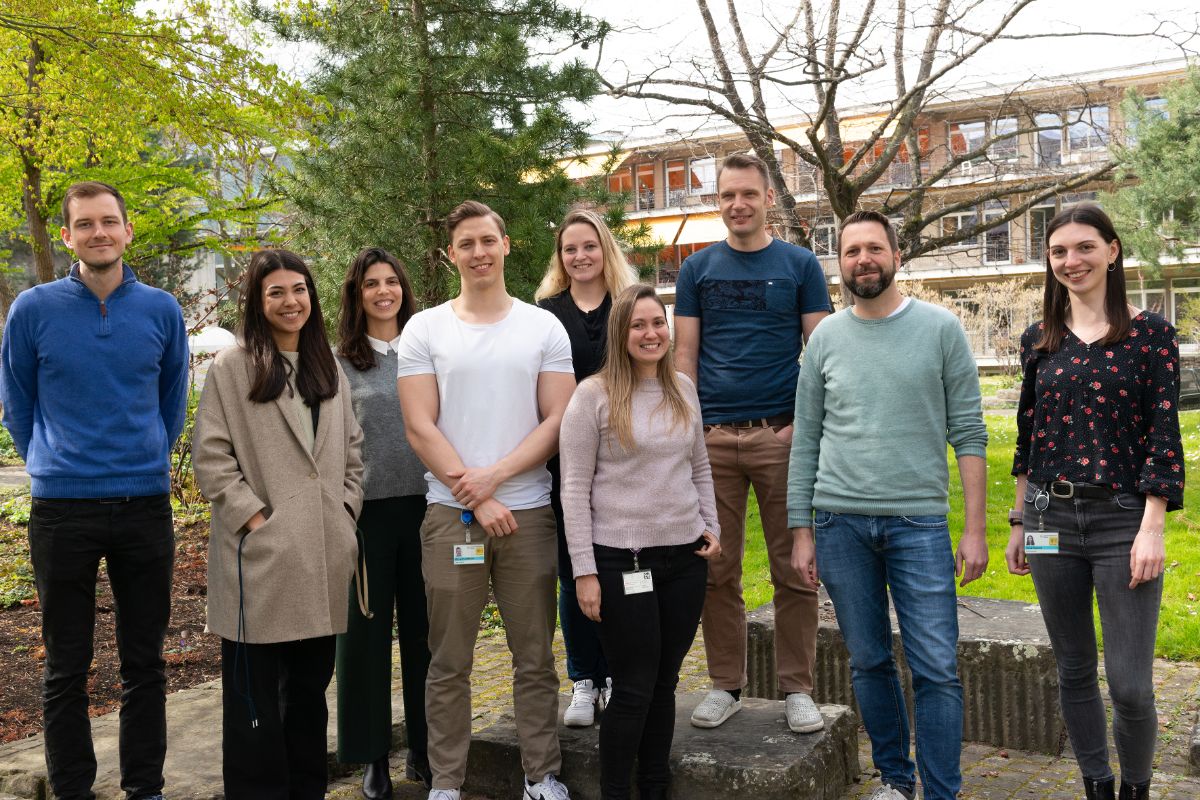
Research Group Leader
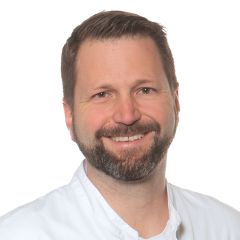
Prof. Heinz Läubli
Leitender Arzt / Leitung Klinische Forschung
medizinische Onkologie FMH, allgemeine Innere Medizin FMH, Mitglied Tumorzentrum, Forschungsgruppenleiter Tumorimmuntherapie, DBM und DKF
Hirntumore, Hauttumore, Thoraxtumore, Immuntherapie
Lab members
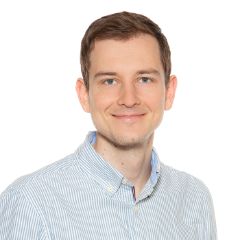
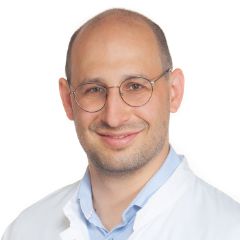
Dr. David König
Oberarzt / Leitung Klinische Forschung
medizinische Onkologie FMH, allgemeine Innere Medizin FMH, Leitung klinische Forschung
Leiter Zentrum für Lungentumore
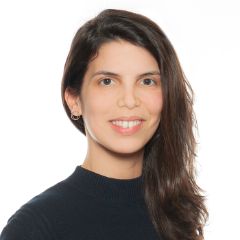
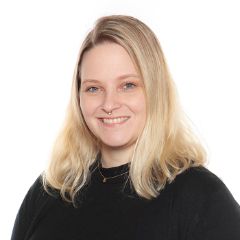
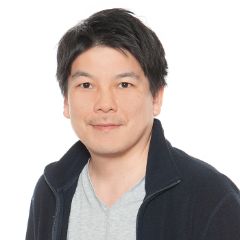
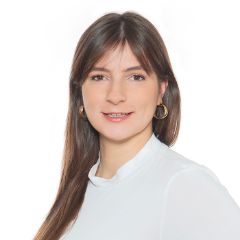
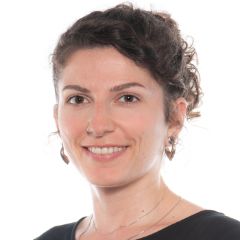
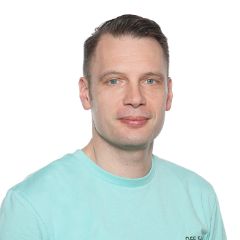
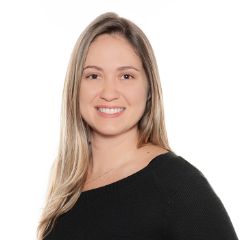

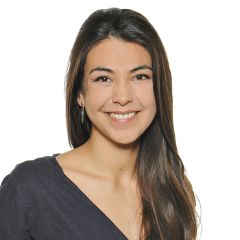
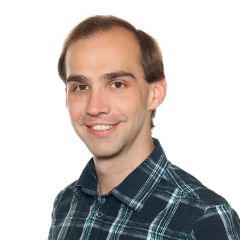
Patient-centered clinical cancer research
Research group of Prof. Viviane Hess
The aim of the research group is to optimize drug-based cancer therapies. Interdisciplinary studies focus on research questions that are relevant to affected patients and their relatives:
- Can side effects be reduced through supportive measures?
- Are there groups of patients who specifically benefit from a therapy (clinical characteristics, biomarkers)?
- How do patients themselves assess the benefits of a therapy (patient-reported outcomes)?
Supported by the Swiss National Science Foundation (SNF-FP PP00P3_139155/1), the group is investigating the question of whether non-drug interventions can improve the effect of chemotherapy. This is being investigated prospectively in three studies:
Stream - actively reduce stress
A web-based stress management program for newly diagnosed cancer patients(www.stress-aktiv-mindern.ch). A randomized, waitlist-controlled trial.
Team: Corinne Urech, Astrid Grossert, Sandra Scherer, Judith Alder, Jens Gaab, Thomas Berger, Viviane Hess
Contact: stream@usb.ch
Supported by Cancer Research Switzerland
Together
Stress, physical activity and survival in patients with newly diagnosed glioblastoma multiforme and their partners (TOGETHER): A prospective, multicenter cohort study.
Team: Katrin Conen, Regula Schüpbach, Mira Katan, Mirjam Christ-Crain, Katharina Rentsch, Ralf Bayreu, Viviane Hess
Centers: USB, University Hospital Zurich (M. Weller), Cantonal Hospital Lucerne (S. Hofer)
Supported by Cancer Research Switzerland
ACTIVE-2
Impact of a structured exercise program during chemotherapy in patients with newly diagnosed advanced colorectal cancer on tumor control and symptoms: a randomized trial. ACTIVE-2/SAKK 41/1
Team: Benjamin Kasenda, Barbara Handschin, Ralph Winterhalder, Ruud Knols, Jacques Hochstrasser, Peter Suter, Josef Thaler, Karin Ribi, Catherine Berset, Martin Bigler and SAKK CC. Translational team: Cathrin Balmelli, Christoph Berger, Andreas Wicki, Reto Ritschard and Viviane Hess
Centers: approx. 20 centers in Switzerland, Austria (AGMT).
This study is being conducted with the Swiss. Arbeitsgemeinschaft für klinische Krebsforschung (SAKK) and supported by the SNSF, Nora Van Meuven Foundation, Department of Medicine of the USB
Team
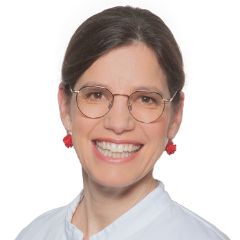
Prof. Dr. Viviane Hess
Leitende Ärztin
FMH Innere Medizin, FMH Medizinische Onkologie
Medizinische Zentren Bauchtumorzentrum
